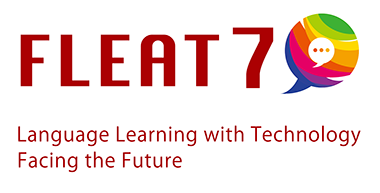

We are organizing optional workshops by invited experts in various fields related to the conference theme before opening the main conference. The workshops are open to anyone and can be participated regardless of the conference registration. The registration form for the workshops will open at the beginning of July.
| Period 時限 |
Time 時間 |
(A) Research Methods 研究手法 |
(B) Classroom Techniques 指導技術 |
(C) ICT Uses ICT活用 |
|---|---|---|---|---|
| 1 | 12:30-14:00 | 外国語教育研究におけるRを用いた統計処理入門 川口勇作 PC教室【40】 |
発音指導の心・技・体 〜国際英語時代だから発音なんてどうでもいいでしょ?〜 靜哲人 一般教室【60】 |
Gain without Pain: Simple BYOD Tools for the Classroom YAMAUCHI, Mari PC Room【40】 |
| 2 | 14:15-15:45 | Basics of thematic analysis in qualitative research TAKAGI, Akiko Classroom【35】 |
英単語の綴りを活用した発音指導 手島良 一般教室【60】 |
Extensive Reading and Listening: Why and How AMELSVOORT, Marcel Van PC Room【40】 |
| 3 | 16:00-17:30 | 外国語教育(研究)における量的データの視覚化と解釈 浦野研 PC教室【40】 |
英語の音韻認識アクティビティ〜音から読み書きへとつなげる指導 村上加代子 一般教室【35】 |
An Exploration of Moodle Features in the Late 3.x Era HARASHIMA, Hideto PC Room【30】 |
| Period/時限 1. 12:30-14:00 |
|---|
| (A) Research Methods/研究手法 |
| 外国語教育研究におけるRを用いた統計処理入門 川口勇作 PC教室【40】 |
| (B) Classroom Techniques/指導技術 |
| 発音指導の心・技・体 〜国際英語時代だから発音なんてどうでもいいでしょ?〜 靜哲人 一般教室【60】 |
| (C) ICT Uses/ICT活用 |
| Gain without Pain: Simple BYOD Tools for the Classroom YAMAUCHI, Mari PC Room【40】 |
| Period/時限 2. 14:15-15:45 |
| (A) Research Methods/研究手法 |
| Basics of thematic analysis in qualitative research TAKAGI, Akiko Classroom【35】 |
| (B) Classroom Techniques/指導技術 |
| 英単語の綴りを活用した発音指導 手島良 一般教室【60】 |
| (C) ICT Uses/ICT活用 |
| Extensive Reading and Listening: Why and How AMELSVOORT, Marcel Van Room【40】 |
| Period/時限 3. 16:00-17:30 |
| (A) Research Methods/研究手法 |
| 外国語教育(研究)における量的データの視覚化と解釈 浦野研 PC教室【40】 |
| (B) Classroom Techniques/指導技術 |
| 英語の音韻認識アクティビティ〜音から読み書きへとつなげる指導 村上加代子 一般教室【35】 |
| (C) ICT Uses/ICT活用 |
| An Exploration of Moodle Features in the Late 3.x Era HARASHIMA, Hideto Room【30】 |
Notes.【 】:Session quota/定員
本ワークショップでは、統計解析環境Rを用いた、外国語教育研究における統計処理の手法を習得することを目指します。はじめに、統計分析の際に必要となるRの基本的な操作方法や動作についての導入を行います。その後、記述統計量(平均、標準偏差など)の算出、t検定、分散分析、相関分析、回帰分析といった、外国語教育研究においてよく用いられる分析方法の実習を行います。参加条件等:会場PCがご利用いただけます。持参されたPCを使用される場合は、事前にRのインストールをお願いいたします。
いいえ。全然どうでもよくありません。(1)なぜ、どうでもよくないのかについて共通理解が得られるよう、「心」を論じます。(2)そしてどうやったらその「心」が40人の生徒に効果的に伝わるのかについて具体的な「技」を説明し、指導風景のビデオ録画をお見せします。(3)でも汚部屋の住人、他人の汚部屋の汚れがわからず、と言います。そもそも教師自身の発音がいまいちであれば生徒の発音が気にならないでしょう。お部屋の清掃のお手伝いをし、生徒の部屋の汚れがわかるようになるための「体」を鍛えます。
This workshop offers hands-on learning about (i)Duolingo, a self-study language learning software, (ii)FlipGrid, a tool for asynchronous discussion using videos, and (iii)Google Classroom, a simple LMS. You will learn through activities how you can utilize these tools in your language classrooms. Related materials, including the manuals for implementation and example cases of using them with the presenter’s students, will be organized and shared in the Classroom for this workshop (a Google account required).
Systematic data analysis is key to conduct rigorous qualitative research. However, novice researchers often struggle in discerning their approach to qualitative data analysis among various choices. This workshop focuses on thematic analysis, the process of identifying patterns or themes by coding within qualitative data. Thematic analysis is not tied to a particular epistemological or theoretical perspective, but can be applied within an array of qualitative methodologies.
The workshop begins by explaining fundamental terminology such as coding, category, theme, and basic steps of coding. Participants then analyze a few research papers and identify how thematic analysis is conducted, followed by a brief hands-on coding experience. Resources about thematic analysis are also provided.
No prior knowledge is necessary in order to attend the workshop.
単語の発音練習というと「範読のあとに生徒が繰り返す」のが一般的です。しかし、語のどの部分をどう発音しているかを意識しないまま鸚鵡返しするだけになりがちです。単語を読ませるのに、単語の綴りの一部から始めて少しずつ文字を書き足しながら音読させていく方法があります。これにより生徒は、文字・綴りと発音の関係を意識しながら、教師のモデルなしで単語を音読できるようになります。子音連続もなめらかになりますし、綴りを覚えるのには正確な発音をするのが近道だということも理解します。その方法を紹介します。
Interest in extensive reading (ER) and extensive listening (EL) has been growing in recent years along with positive research results and developments in technology that facilitate the delivery and monitoring (tracking) of students performance. A considerable amount of research into the benefits of ER and EL has emerged, as well as a better understanding of the conditions that need to be met and what program features can lead to greater rates of success. Tangible benefits of extensive reading (such as reading speed improvements and proficiency test score increases) come with reading very large quantities of text, hundreds of thousands of words, requiring sufficient engagement over long periods of time. Teachers and administrators can do a lot to encourage such reading and listening by adding various features that nudge students toward greater engagement.
This presentation will explain the rationale for establishing an ER/EL program or adding this activity to existing courses. We’ll look at some of the options for all budgets available for choosing and delivering texts (both web-based and web-blended). We’ll also cover monitoring student performance and ways of improving compliance. Participants will also get a chance to explore the XReading online ER/EL system.
外国語教育に携わる私たちは、研究においてだけでなく、テストや成績処理といった場面で日ごろから数量化されたデータを扱っています。本ワークショップでは、教育や研究で量的データを扱う際にまず行うべきデータの視覚化と、データの特徴を理解するための基本的な概念としての代表値・分布・効果量の意味について学び、フリーでオープンソースの統計ソフト jamovi を使って、実際にデータの簡単な分析ができるようになることを目指します。
参加条件等:実際にデータの分析を行いながら進める予定です。そのため、受講者のみなさんには jamovi をインストールしたPC等を持参していただきたいと考えています。Windows, MacOS, Linux, ChromeOS 用のものが以下のサイトよりダウンロード可能です。ソフトの操作がワークショップの中心ではないので、PCなしでの参加も問題ありません。
https://www.jamovi.org/
英語の単語読み書きがスムーズにできるようになるためには、文字を覚えるだけでなく、文字に対応する音への気づきや操作スキルが十分に育っていることが重要です。単語よりも小さな音節やオンセット-ライム、音素などの音韻単位はどのように指導すれば良いのでしょうか。またそれらの音韻単位は読み書き発達にどのように関係しているのでしょうか。主に小学生向けの、文字を使わない楽しい音韻認識アクティビティをご紹介します。
This workshop will focus on some useful features adopted lately in Moodle. The topics will include the new interface, the cool new dashboard, the standard Boost theme, how to enhance the front page appearance, an easier and more secure way of authentication using OAuth2, searching for and installing new plugins, improving Moodle mobile compatibility, using LTI for connecting to other LMS sites, applying some basic Learning Analytics tools to students’ performances, and testing the built-in audio and video recording function, among other things. If time allows, we will also investigate the new enhancements in the Forum module adopted in Moodle version 3.7. Moodle teachers with the Administrator role may benefit most from this workshop, but ordinary teachers will nonetheless be able to learn new things which they may apply to their everyday teaching.
Target audience: Teachers with some experience teaching with Moodle